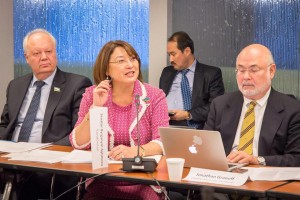
Senator Byrganym Aitimova from Kazakhstan addressed the PNND assembly in Washington, DC, on Feb. 25-27, 2014.
WASHINGTON – Members of Parliamentarians for Nuclear Non-Proliferation and Disarmament (PNND) have urged the global leaders converging in The Hague early next week for the Nuclear Security Summit to “commit to include in the agenda of your next meeting work on substantive plans to achieve the universal, legally verifiable elimination of nuclear weapons.”
“If this summit process cannot include this issue in its agenda, we strongly urge you to establish a parallel process at the same high political level. We commit to support such efforts in our respective legislative bodies,” the PNND said in its statement, adopted at the end of the PNND assembly held in Washington, DC, in late February.
PNND is a nonpartisan forum for parliamentarians to share resources and information, develop cooperative strategies and engage in nuclear nonproliferation and disarmament issues, initiatives and arenas, nationally and internationally. It brings together members of national and regional parliaments from around 80 countries and regions, including Bangladesh, Canada, the Czech Republic, Germany, Japan, Kazakhstan, Scotland, South Korea and the United States.
At their Washington meeting meant to highlight the humanitarian imperative to achieve a nuclear weapons free world, legislators welcomed the upcoming summit in The Hague on March 24-25 and said they “support these efforts and commend the U.S., South Korea and the Netherlands for hosting, President Obama for initiating this work to make the world safer by gaining better control over dangerous nuclear materials.”
It was in 2009 that U.S. President Barack Obama proposed convening nuclear security summits every two years with a goal of giving a powerful impetus to securing nuclear materials around the world. The first such meeting took place in April 2010 in the U.S. capital; the second summit took place in Seoul in March 2012. The summits focus exclusively on the safety and security of the world’s nuclear materials, and purposefully do not include nuclear disarmament issues on their agenda.
This, however, should change, the PNND’s recent statement says.
“The existence of bomb-grade nuclear materials creates the risk of the use of a nuclear weapon. Any use would have catastrophic humanitarian and environmental consequences, causing immeasurable suffering. This must be prevented,” the Feb. 27 PNND statement said. “The highest level of commitment by the leaders of nuclear weapons states, and others, is required to reduce this risk by gaining control over these materials.”
“Similarly, the highest level of political commitment is needed to achieve the global common good of ending the risk that nuclear weapons will ever be used by a terrorist – or a state – by accident, design or madness. Only by eliminating nuclear weapons will this risk be eliminated. We believe that achieving this global common good requires efforts at every level – local, national, and global,” the statement continued.
“However, the existential imperative of ending the threat of nuclear weapons requires the highest level of political commitment, cooperation, and action. We therefore strongly urge you to commit to include in the agenda of your next meeting work on substantive plans to achieve the universal, legally verifiable elimination of nuclear weapons,” the PNND assembly said, urging the establishment of a parallel process at the same high political level if the summit process cannot include this issue in its agenda.
Two members of Kazakhstan’s Parliament, Byrganym Aitimova from the Senate and Viktor Rogalev from the Mazhilis, participated in the PNND assembly in Washington, DC, which concluded with a major gathering at the U.S. Senate.
Karipbek Kuyukov, honorary ambassador of the ATOM Project, a global education and online petition campaign, also participated in that event, presenting his paintings and urging parliamentarians to work more vigorously toward a nuclear weapons free world.
President Nursultan Nazarbayev of Kazakhstan, who participated in both the Washington and the Seoul summits, is expected to take part in The Hague’s summit, too. Overall, more than 50 heads of state and government and leaders of international organisations participated in the previous two gatherings and are scheduled to come to the Netherlands next week.

